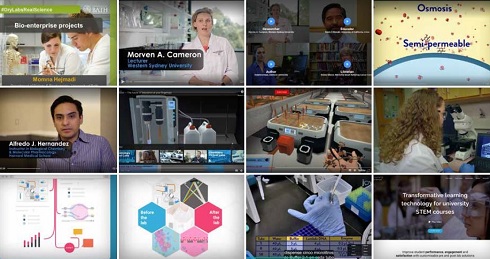Practical thinking in a pandemic

Dr Prachi Stafford, Dr Dominic Henri, Professor Ian Turner, Dr David Smith and Dr Nigel Francis discuss how the move to virtual teaching has been especially challenging for practical science, but is also an opportunity to develop new approaches and skills
28th September 2020
Part II of this double feature on education during the pandemic, looking at final year projects, can be found here.
Be it laboratory, practice or field work, practical learning experiences are an integral component of the student experience. Students get to apply their subject knowledge directly, problem solve together and develop key skills for becoming a bioscientist.
Practical learning also has a sizable impact on student motivation, attainment and employability. Yet providing meaningful practical experiences through governmental and institutional responses to COVID-19 has been tumultuous for lecturers in the UK. As the number of COVID-19 cases increased, universities shut their physical doors and teaching was transferred online almost overnight. Academics had to adapt to new methods of delivery, modify existing resources and develop new assessment tools, all under considerable time pressure.
Now that it has become apparent that we will be living with COVID-19 for the foreseeable future, life science academics are also having to rethink and re-imagine their practical classes’ curriculum to address issues such as social distancing and shielding. In institutions where labs can be delivered, classes will be in smaller groups, with students working individually.
Sharing resources
While the breadth of these classes will be reduced, it will still be essential to meet the learning outcomes and ensure that students develop the relevant core skills. Indeed, this is seen as a requirement for many programmes, including those accredited by the RSB. Standards and proficiencies need to be maintained as the aim of higher education remains the development of competent scientific practitioners who can meet unknown future challenges.
While challenging for all, this can also be seen as a positive opportunity to re-evaluate our teaching approach, upgrade and embed new skills, and teach the curriculum of the future. The COVID-19 crisis has led to a community-wide response from the biosciences higher education sector, with those with expertise in pedagogical approaches embracing new teaching platforms and readily sharing resources within the community through collaborative networks such as #DryLabsRealScience.
One of the most immediate and tangible responses was the increase in resources focusing on the remote delivery of content (including the traditional lecture). One such resource is Lecturemotely, a collaborative resource hub created to support lecturers and students. The site houses a wealth of information ranging from novel teaching and assessment methods to ways to support students during remote teaching, and ideas and alternatives to final year capstone research projects.
Practical alternatives
To support and aid transition to ‘dry’ or simulated labs, Dr Nigel Francis, Dr David Smith and Professor Ian Turner hosted fortnightly webinars for the bioscience community to share good practice, experiences and other tips. Sessions covered a range of topics from the use of simulations in pre-lab teaching, provided by commercial companies such as Labster and Learning Science, through to academics sharing examples of successful adaptations of practicals to the remote world.
Recordings of the webinars can be accessed through the Lecturemotely website, alongside supporting ‘how-to’ walkthroughs and free resources guides for a range of topics. Videos demonstrating an array of techniques have been created and collections of free resources to support learning have been shared on this and other sites, including an open-source list of field ecology resources, which includes invitations for guest lecturing opportunities (much enhanced by a blended learning environment). Science video archives such as JoVE have also made content available.
Sessions highlighted the importance of simulations and virtual experiences to prepare students for their practical experiences, and where laboratory time is limited using that time to develop psychomotor skills. Follow-up materials and group activities are subsequently delivered online. Alternative capstone research projects were also presented and highlighted the breadth of ways in which students can demonstrate critical analysis and knowledge generation. These ideas have been used to create a series of one-page how-to guides such as using video to capture practical and the use of augmented reality.
Bioscientists from across the world have been collating and sharing inspiring digital resources to invigorate learning experiences at a scale not experienced before, building a global community of practice. The willingness of individuals to share best practice has been a hallmark of this network, as exemplified by the team from De Montfort University, consisting of Dr Jo Rushworth, Dr T J Moore and Dr Beth Rogoyski, who developed the Lecturemotely website to share these and other resources produced by the global bioscience community.
 Platforms such as JoVe have an archive of video demonstrations of both basic and complex practical procedures
Platforms such as JoVe have an archive of video demonstrations of both basic and complex practical proceduresAsking students to engage with online pre-lab learning will have the added benefit that questions will be more targeted, or about technical aspects of procedures, thus allowing for a deeper appreciation of why and how techniques are used. The value of pre-practical activities is well established in chemistry[1], but less so in the biosciences. However, this is changing, with recent publications[2, 3, 4] demonstrating that students value these virtual pre-practical learning activities and that they lead to an enhanced learning experience as students arrive ready to perform the physical practical. These approaches also enable students to take control of their own learning, developing independent skills, and improving outcomes and attainment.
The change in standard laboratory classes has also led to academics being more ambitious in what they are prepared to try for the final year capstone research projects. Studies on educational development, public perceptions of science, science communication, commercial and technical reports and many others have been undertaken.
Dr David Lewis from the University of Leeds has been developing capstone research projects and has created a range of resources for colleagues to use that all address the RSB accreditation standards. The inclusion of these multifaceted assignments and other enquiry-based research can encourage students to develop a multitude of transferable skills, including research, time-management, planning, team working, critical thinking and presentation, all of which are valuable in the workplace.
Data sharing revolution
The expansion in ‘omics’ studies, coupled with the development in bioinformatic analysis, has led to the generation of a wealth of data that is often made accessible to other scientists via data-sharing platforms. As we move into the future, bioinformatics and data handling are as much the tools of a bioscientist as the pipette and quadrat, and are more easily reproduced virtually. Similar changes driven by growth in citizen science, open-access data repositories and remote imaging dramatically expand the possibilities in ecological inquiries – who doesn’t want to study brown bear behaviour in Alaska via a webcam in real time? There is now the opportunity to mine these databases as part of our practical experience in a bid to answer relevant research questions.
Until now, those without the established expertise have been reluctant to embrace this approach. However, with COVID-19 and the acknowledgement that engaging in these large-scale data analyses can yield novel and insightful results, there has been an incentive for academics to push and engage with relevant training as well as include some aspects within their curriculum. The way we do science is evolving at a fast pace, and the incorporation of such new skills will undoubtedly benefit students and will feed into employability and new careers routes.
The COVID-19 pandemic has forced academics to re-evaluate approaches to teaching and provides wide-ranging opportunities for novel, imaginative teaching interventions, especially in the areas of lab and fieldwork. Rather than seeing the current situation as a negative, educators are reframing and looking for the opportunities that the situation presents. This is the time to try new approaches and propel teaching in higher education into the 21st century. These changes to our shared practices will inevitably have long-term impacts on the way we teach and will reshape and transform the future and evolution of biosciences in higher education.
This article was proposed and coordinated by HUBS Early Career Bioscience Lecturers. Part II of this double feature on education during the pandemic, looking at final year projects, can be found here.
Dr Prachi Stafford is a senior lecturer in biological sciences at Sheffield Hallam University and a member of the HUBS Early Career Lecturers’ Group.
Dr Dominic Henri MRSB was the RSB’s Higher Education Bioscience Teacher of the Year 2018 and is a senior lecturer and director of studies at the University of Hull.
Dr Nigel Francis FRSB is associate professor in biomedical sciences at Swansea University.
Dr David Smith was the RSB’s Higher Education Bioscience Teacher of the Year 2019, and is a reader in biochemistry at Sheffield Hallam University.
Professor Ian Turner MRSB was named the RSB’s Higher Education Bioscience Teacher of the Year 2017 and is Professor in Learning and Teaching in Higher Education at the University of Derby.
• Lecturemotely. www.lecturemotely.com
• Labster. www.labster.com
• Learning Science. www.learningscience.co.uk
• List of ecology field resources. bit.ly/Ecology_field_resources
• Peer reviewed science experiment videos from JoVE. www.jove.com
• Professor Ian Turner demonstrates how videos can be used in practical science. bit.ly/view_from_the_socs
1) Agustiana, H. Y. & Michael, K. S. Reasserting the role of pre-laboratory activities in chemistry education: a proposed framework for their design. Chem. Edu. Res. Prac. 4 (2017).
2) Coleman, S. K. & Smith, C. L. Evaluating the benefits of virtual training for bioscience students. High. Educ. Pedagog. 4(1) (2019).
3) Cann, A. J. Increasing student engagement with practical classes through online pre-lab quizzes. J. Bio. Ed. 50(1) (2016).
4) Scott, P. H. et al. Enhancing theoretical understanding of a practical biology course using active and self-directed learning strategies. J. Bio. Ed. 52(2) (2018).
An accompanying article Reshaping education: Reimagining the final year project can be found here.


